Learn More About Bunded Fuel Tank Regulations
Learn More About Bunded Fuel Tank Regulations
Failing to comply with any oil storage regulations that are relevant to your property or site can result in a hefty fine and prosecution. For people, organizations and companies that must regularly store oil on site, whether they intend to use this to support their operations, power their fleets or generate heat, complying with the regulations that the government has set forth is a vital part of ensuring personal and public safety, and protecting the natural environment. This remains true, whether or not fines are levied. Following are a few, very important things to know about bunded fuel tank regulations.
One of the greatest concerns relating to the use of substandard storage methods is the potential for leaks and spills. These can have a very devastating impact on the local ecosystem and on the overall environment. These events can also pose an immediate threat to people, animals and other populations. For these and many other reasons, oil tanks have to be scheduled and performed on a routine basis. Moreover, in order to comply with the related regulations, these inspections must be performed by licensed and qualified professionals and duly recorded.
Bunded tanks are legally required in the UK whenever personal storage tanks or those that are used in the home exceed capacities of 3500 liters. These tanks are also required in commercial environments in which commercial and industrial site tanks can hold more than 200 liters of fuel. In addition to bunded tanks, fuels can also be stored in containers like bowsers, drums or immediate bulk container along with an additional containment unit.
It is important to note that these requirements apply solely to the sizes or capacities of the tanks. This means that larger tanks that carry less fuel on a routine basis must still meet this requirement due to their capacity. As such, companies that store far less than 200 liters of fuel in their 200-liter tanks must regularly have testing and inspections performed.
Risk assessments are also required in many instances. Whenever commercial or residential properties have containers that entail a significantly higher level of risk than normal, this additional measure is performed. This is the case for all tanks that exceed the 3,500 liter capacity.
Other factors that can denote the need for an additional risk assessment is the presence of storage containers near a controlled body of water such as a stream, lake, pond, canal or river. Coastal water also applies in this instance. The goal is to take extra safety precautions as the result of their higher, environmental risks of these locations.
Your site may require this assessment if the containment unit is positioned near a manhole cover or open drain. Whenever there is a borehole, well, spring or other source of potable water nearby, this preventative measure is necessary. A complete list of features that might warrant the need of an additional risk assessment can be easily obtained online.
Regulations can also vary according to the existence of these and other factors. There is no single standard that can accommodate for all of the different variables pertaining to capacity, location, fuel types, and overall environment. Due to this fact, all parties opting to use bunded fuel tanks on their properties should make sure to understand and adhere to any related regulations.


